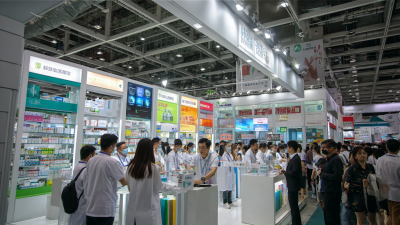
What is a Pharmaceutical Supplier and How Do They Impact the Healthcare Industry
The role of a Pharmaceutical Supplier is critical within the intricate framework of the healthcare industry, acting as a crucial link between drug manufacturers and healthcare providers. As the demand for effective and safe medications rises, understanding the responsibilities and impact of pharmaceutical suppliers becomes increasingly important. These entities not only ensure that essential medicines reach hospitals and pharmacies but also navigate the complexities of regulations, quality assurance, and supply chain logistics.
In an era where the efficiency of medication distribution can significantly influence patient outcomes, pharmaceutical suppliers are at the forefront of healthcare delivery. Their influence extends beyond mere logistics; they are instrumental in maintaining the integrity of the pharmaceutical supply chain, ensuring that healthcare providers have access to the right products at the right time. This essay aims to explore the multifaceted role of pharmaceutical suppliers and examine how they impact the overall efficiency, accessibility, and quality of healthcare services. Through a detailed analysis, we will uncover the vital functions that these suppliers perform and the challenges they face in a rapidly evolving healthcare landscape.

Understanding the Role of Pharmaceutical Suppliers in the Healthcare Ecosystem
Pharmaceutical suppliers play a crucial role in the healthcare ecosystem, serving as the bridge between manufacturers and healthcare providers. They are responsible for sourcing, storing, and distributing medications and healthcare products, ensuring that hospitals, pharmacies, and clinics have access to essential treatments. By maintaining a consistent supply chain, pharmaceutical suppliers help prevent drug shortages, which can have dire consequences for patient care. Their logistical expertise ensures that medications are delivered in a timely and efficient manner, maintaining the integrity of products that are often sensitive to temperature and storage conditions.
Moreover, pharmaceutical suppliers contribute to the overall efficiency of the healthcare industry by offering valuable insights into market trends and product availability. They often work closely with healthcare providers to forecast demand and manage inventory, reducing waste and lowering costs. This collaboration enables healthcare facilities to focus on patient care, knowing that they have reliable access to the necessary medications. As the industry continues to evolve with the introduction of new therapies and regulations, the role of pharmaceutical suppliers becomes even more integral in maintaining a responsive and effective healthcare system.
Impact of Pharmaceutical Suppliers on the Healthcare Industry
Key Functions and Responsibilities of Pharmaceutical Suppliers
Pharmaceutical suppliers play a critical role in the healthcare industry, acting as the crucial link between manufacturers and healthcare providers. Their primary function is to ensure the efficient distribution of medications, medical devices, and other essential healthcare products. According to a report by Grand View Research, the global pharmaceutical logistics market is expected to reach USD 106.2 billion by 2025, illustrating the growing importance of these suppliers in managing the supply chain effectively. They are responsible for maintaining proper storage conditions, tracking inventory levels, and ensuring timely deliveries, which is vital for patient care.

In addition to logistics, pharmaceutical suppliers also handle regulatory compliance, securing the necessary certifications and adhering to industry standards. This regulatory oversight is increasingly important, as non-compliance can lead to serious implications for healthcare providers and patients alike. A survey from the Pharmaceutical Research and Manufacturers of America (PhRMA) indicates that 78% of pharmaceutical professionals believe that the role of suppliers in navigating complex regulations has grown significantly. By streamlining the supply chain and ensuring compliance, pharmaceutical suppliers directly contribute to the availability and accessibility of critical medications, ultimately impacting patient outcomes and overall healthcare effectiveness.
Impact of Pharmaceutical Suppliers on Drug Availability and Pricing
Pharmaceutical suppliers play a crucial role in the healthcare industry, significantly influencing both drug availability and pricing. The recent discussions surrounding tariffs on pharmaceutical imports highlight the delicate balance these suppliers maintain within global supply chains. Proposed tariffs could disrupt these established networks, leading to increased production costs and potential shortages of vital medications. When pharmaceutical suppliers face higher costs due to tariffs, they may be compelled to raise prices, directly impacting patients and healthcare providers.
The implications of increased drug pricing are far-reaching. As the government considers various pricing protocols, including measures aimed at promoting more favorable pricing structures, the response from pharmaceutical suppliers will be critical. If suppliers are unable to absorb higher costs or navigate tariff-induced challenges, the resulting price hikes could leave many patients with unaffordable medications. Moreover, potential shortages from disrupted supply chains may exacerbate the ongoing challenges in the healthcare system, making it essential to carefully assess the long-term effects of such policies on drug availability and overall healthcare access.
Future Trends in Pharmaceutical Supply Chain Management
The outsourcing trend in the pharmaceutical industry is significantly shaping the future of supply chain management. As companies increasingly delegate their logistics operations, they are able to concentrate on their core competencies, such as research and development (R&D). This strategic move not only optimizes operational efficiency but also drives growth in the global pharmaceutical logistics sector. Outsourcing allows pharmaceutical firms to leverage specialized logistic providers who can ensure better handling of complex supply chain requirements, including cold chain management, which is crucial for transporting sensitive biologics.

Looking ahead to 2033, the healthcare logistics market is projected to expand substantially, driven by innovations and the growing demand for biopharmaceuticals. This evolution will necessitate a shift in how supply chains are managed, with an emphasis on flexibility and responsiveness to market changes. Embracing trends such as artificial intelligence and new business models in logistics will be vital for organizations as they seek to enhance their service offerings and operational capabilities, ultimately benefiting patient care and industry profitability.
Navigating Regulatory Challenges as a Pharmaceutical Supplier
Navigating regulatory challenges is a critical aspect for pharmaceutical suppliers, as non-compliance can lead to severe consequences, including financial penalties and loss of market access. Suppliers must not only understand the complex network of regulations that govern drug safety and efficacy but also remain updated on changes in legislation across different regions. This involves obtaining the necessary certifications and adhering to stringent quality control measures to ensure that their products meet the standards set by regulatory bodies.
Tips: One effective strategy is to establish a robust compliance program that includes regular training for staff on current regulations and best practices. Additionally, maintaining open communication with regulatory agencies can provide suppliers with clarity on compliance requirements and help preempt potential issues.
Moreover, pharmaceutical suppliers should invest in technology that facilitates compliance tracking and reporting. Utilizing sophisticated software can streamline the data management processes, allowing suppliers to swiftly adapt to regulatory changes. Establishing strong relationships with legal and regulatory experts can also provide invaluable guidance in navigating the intricacies of pharmaceutical regulations, ensuring long-term success in the healthcare industry.
Related Posts
-

Navigating the Landscape of Best Pharmaceutical Supplier Choices for Your Business
-

Ultimate Guide to Choosing the Right Pharmaceutical Supplier for Your Business
-

Advantages of Choosing the Right Pharmaceutical Supplier for Your Business
-

How to Streamline Your Pharmaceutical Supply Chain for Maximum Efficiency
-

Exploring Pharmaceutical Supply Trends at the 138th Canton Fair in China 2025
-

How to Source High Quality Pharmaceutical Chemicals for Global Supply Chains
